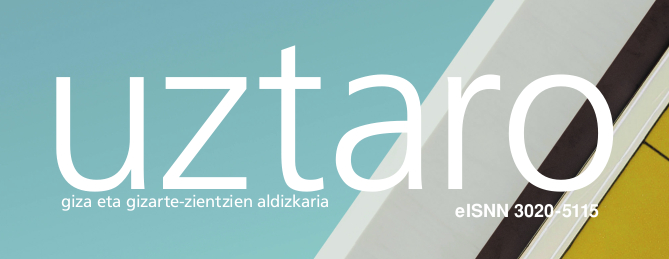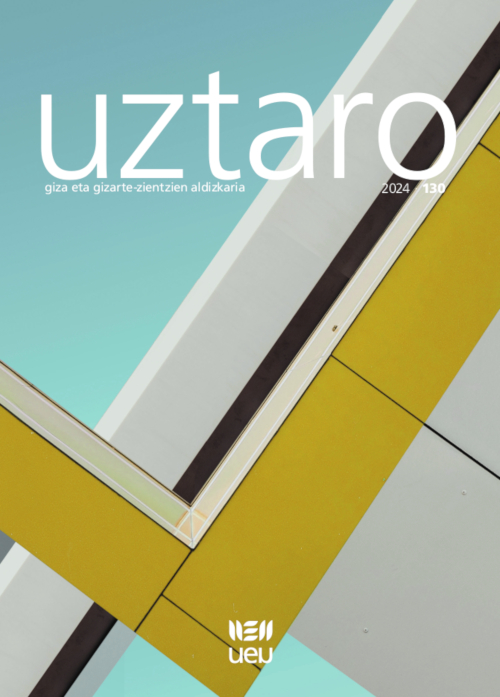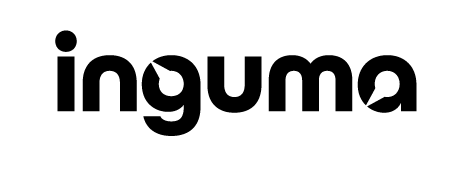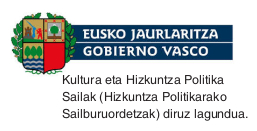Hezkuntza-berrikuntzarako esperientzia
DOI:
https://doi.org/10.26876/uztaro.130.2024.5084Gako-hitzak:
Hezkuntza-berrikuntza, Kasuaren metodoa, Diziplinartekotasuna, Ikaskuntza kooperatiboaLaburpena
Lan honetan, Euskal Herriko Unibertsitateko (UPV/EHU) 370 ikaslerekin egindako hezkuntza-berrikuntzako esperientzia bat aurkezten da. Kasuaren metodoan oinarrituta, diziplinarteko ikuspegi batetik eta ikaskuntza kooperatiboaren bidez, ezagutza teorikoa benetako egoerekin eta testuinguru profesionalekin erlazionatu nahi izan da. Kasuaren metodoa hezkuntza-beharrak dituen ikasle batean oinarrituta dago. Psikologia, Lehen Hezkuntza eta Gizarte Hezkuntzako ikasleak taldetan antolatu ziren eta kasua diziplinarteko ikuspegi batetik aztertu eta ebatzi zuten. Hainbat parte-hartzailek galdetegi batzuk bete zituzten kasuaren lanketarekin hasi aurretik eta ondoren, haien motibazioa eta ikaskuntza kooperatiboaren eta diziplinartekotasunaren inguruko pertzepzioa ezagutzeko. Emaitzetan ikusten denaren arabera, ezberdintasun esanguratsuak lortu ziren aldagai guztietan proiektuan parte hartu aurreko eta ondorengo puntuazioen artean. Beraz, lan honetan agerian geratzen da diziplinartekotasunean eta kasuaren metodoan oinarritutako hezkuntza-estrategien erabilerak hobetu egiten duela ikasleek ikas-kuntza kooperatiboari eta diziplinartekotasunari buruz duten pertzepzioa, bai eta haien motibazioan ere. as their motivation.
Deskargak
Erreferentziak
Anderson, L.J.; Bunnell, S.L., eta Yates, J. (2017). Improving student learning trough and interdisciplinary case study: Exploring eutrophication in Lake Erie. Case Study Pedagogy, 1(1), 1-11. https://doi.org/10.1525/cse.2017.000356 DOI: https://doi.org/10.1525/cse.2017.000356
Bennett, S. (2010). Investigating strategies for using related cases to support design problem solving. Educational Technology Research & Development, 58(4), 459-80. https://doi.org/10.1007/s11423-009- 9144-7 DOI: https://doi.org/10.1007/s11423-009-9144-7
Borrego, M., eta Newswander, L.K., (2010). Definition of interdisciplinary research: Toward graduate- level interdisciplinary learning outcomes. The Review of Higher Education, 34(1), 61-84. https://doi.org/10.1353/rhe.2010.0006 DOI: https://doi.org/10.1353/rhe.2010.0006
Calderón, C., eta Escalera, G. (2008). La evaluación de la docencia ante el reto del Espacio Europeo de Educación Superior. Educación XX1, 11(1). https://doi.org/10.5944/ educxx1.11.0.316 DOI: https://doi.org/10.5944/educxx1.11.0.316
Domik, G., eta Fischer, G. (2010). Coping with complex real-world problems: Strategies for developing the competency of transdisciplinary collaboration. IFIP Advances in Information and Communication Technology, 324, 90-101. DOI: https://doi.org/10.1007/978-3-642-15378-5_9
Fernández-Río, J.A.; Cecchini, A.; Méndez-Giménez, D.; Méndez-Alonso, D, eta Prieto, J.A. (2017). Self-regulation, cooperative learning, and academic self-efficacy: interactions to prevent school failure. Frontiers in Psychology, 8, 22. http://dx.doi.org/10.3389/fpsyg.2017.00022 DOI: https://doi.org/10.3389/fpsyg.2017.00022
Fraser, S.W., eta Greenhalgh, T. (2001). Coping with complexity: Educating for capability. British Medical Journal, 323, 799-803. https://doi.org/10.1136/bmj.323.7316.799 DOI: https://doi.org/10.1136/bmj.323.7316.799
GIFD – Grup Interuniversitari de Formació Docent (2011). Identificación, desarrollo y evaluación de competencias docentes en la aplicación de planes de formación dirigidos a profesorado universitario (EA2010-0099). Programa estudios y análisis destinado a la mejora de la calidad de la enseñanza superior y de la actividad del profesorado universitario, Ministerio de Educación, Gobierno de España.
Gifre, M., eta Esteban, M. (2013). Consideraciones educativas de la perspectiva ecológica de Urie Bronferbrenner. Contextos Educativos, 15, 79-92. http://dx.doi.org/ 10.18172/con.656 DOI: https://doi.org/10.18172/con.656
Gonzalez, N. (2013). Metodologías activas en la docencia universitaria: Importancia, conocimiento y uso en opinión del profesorado. Revista de Evaluación Educativa, 2(2). http://revalue.mx/revista/index.php/revalue/issue/current
Ivanitskaya, L.; Clark, D.; Montgomery, G., eta Primeau, R. (2002). Interdisciplinary learning: Process and outcomes. Innovative Higher Education, 27(2), 95-111. DOI: https://doi.org/10.1023/A:1021105309984
Jacob, W.J. (2015). Interdisciplinary trends in higher education. Palgrave Communications, 1, 15.001. http://dx.doi.org/10.1057 palcomms.2015.1 DOI: https://doi.org/10.1057/palcomms.2015.1
Jahn, T.; Bergmann, M., eta Keil, F. (2012), Transdisciplinarity: Between mainstreaming and marginalization. Ecological Economics, 79, 1-10. http://dx.doi.org/10.1016/j.ecolecon.2012.04.017 DOI: https://doi.org/10.1016/j.ecolecon.2012.04.017
Jaureguizar, J.; Berasategui, N.; Aizpurua, A.; Aróstegui, I.; Guerra, N., eta Arribillaga, A. (2018). A case study from an interdisciplinary view: its relation with cooperative learning. ICERI, International Conference of Education, Research, and Innovation, 12-14 November. http://dx.doi.org/10.21125/iceri.2018.0569 DOI: https://doi.org/10.21125/iceri.2018.0569
Jimenez, M.; Astudillo, C.; Reveco J., eta González, M. (2019). Desarrollando la abstracción en adultos emergentes: Primer año de ingeniería. Revista Iberoamericana de Educación en Ingeniería (RIEI). Bol. 1, 3. https://www.scipedia.com/public/Jimenez_et_al_2019a
Johnson, D., eta Johnson R. (2014). La evaluación en el aprendizaje cooperativo. Cómo mejorar la evaluación individual a través del grupo. Ediciones SM.
Jones, R. (2004). The failure of the universities of Wales. National Eisteddfod Lecture, Newport. Institute of Welsh Affairs.
Klaassen, R.G. (2018). Interdisciplinary education: A case study. European Journal of Engineering Edu- cation, 43(6), 842-859. https://doi.org/10.1080/03043797.2018.1442417 DOI: https://doi.org/10.1080/03043797.2018.1442417
Lattuca, L.R.; Voigt, L.J., eta Fath, K.Q. (2004). Does interdisciplinarity promote learning? Theoreticals support and researchable questions. The Review of Higher Education, 28(1), 23-48. http://dx.doi.org/10.1353/rhe.2004.0028 DOI: https://doi.org/10.1353/rhe.2004.0028
Ledford, H. (2015). How to solve the world’s biggest problems. Nature, 525, 308-311. http://dx.doi.org/10.1038/525308a DOI: https://doi.org/10.1038/525308a
Little, A., eta Hoel, A. (2011). Interdisciplinary team teaching: An effective method to transfrom student attitudes. The Journal of Effective Teaching, 11(1), 36-44.
MacLeod, M., eta T. Van der Veen, J. (2020). Scaffolding interdisciplinary project-based learning: A case study. European Journal of Engineering Education, 45(3), 363-377. http://dx.doi.org/10.1080/03043797.2019.1646210 DOI: https://doi.org/10.1080/03043797.2019.1646210
MacNair, L.; Newswander, C.; Boden, D., eta Borrego, M. (2011). Student and faculty interdisciplinary identities in self-managed teams. Journal of Engineering Education, 100(2), 374-96. https://doi.org/10.1002/j.2168-9830.2011.tb00018.x DOI: https://doi.org/10.1002/j.2168-9830.2011.tb00018.x
Martínez, M.; Buxarrais, M.R., eta Esteban, F. (2002). La universidad como espacio de aprendizaje ético. Revista Iberoamericana de educación. DOI: https://doi.org/10.35362/rie290949
Noy, S.; Rebecca, P.; Capetola, T., eta Mc. Burnie, J.M. (2017). Inspiration from the classroom: a mixed method case study of Interdisciplinary sustainability learning in Higher Education. Australian Journal of Environmental Education, 33(2), 97-118. http:// DOI: https://doi.org/10.1017/aee.2017.22
dx.doi.org/10.1017/aee.2017.22
Rueda, E.; Mares, G.; Gonzáles, L.F.; Rivas, O., eta Rocha, H. (2017). La participación en clase en alumnos universitarios: factores disposicionales y situacionales. Revista Iberoamericana de educación, 74(1), 149-162. https://doi.org/10.35362/rie741632 DOI: https://doi.org/10.35362/rie741632
Souppez, J.B.R. (2016). An interdisciplinary approach to education: case study of an academic exchange. Education & Professional Development of Engineers in Maritime Industry.
Spelt, E.; Harm, J.A.; Biemans, H.T.; Luning, P.A., eta Mulder, M. (2009), Teaching and learning in interdisciplinary higher education: A systematic review. Educational Psychology Review, 21, 365-378. http://dx.doi.org/10.1007/s10648-009-9113-z DOI: https://doi.org/10.1007/s10648-009-9113-z
Stentoft, D. (2017). From saying to doing interdisciplinary learning: Is problem-based learning the answer? Active Learning in Higher Education, 18(1), 51-61. https://doi.org/10.1177/146978741769351 DOI: https://doi.org/10.1177/1469787417693510
Trujillo, F., eta Ariza, M.A. (2006). Experiencias educativas en aprendizaje cooperativo. Grupo Editorial Universitario.
UNESCO (2009). Review of Contexts and Structures for Education for Sustainable Development: Learning for a sustainable world. http://unesdoc.unesco.org/images/0018/001877/187757e.pdf
Wright, M.C., Bergom, I., eta Bartholomew, T. (2019). Decreased class size, increased active learning? Intended and enacted teaching strategies in smaller classes. Active learning in higher education, 20(1), 51-62. doi: org/10.1177/1469787417735607 DOI: https://doi.org/10.1177/1469787417735607
Woods, C. (2007). Researching and developing interdisciplinary teaching: towards a conceptual framework for classroom communication. Higher Education, 54, 853-866. http://dx.doi.org/10.1007/s10734-006-9027-3 DOI: https://doi.org/10.1007/s10734-006-9027-3
Lizentzia
Copyright (c) 2024 Nagore Guerra Bilbao, Alaitz Aizpurua Sanz, Igone Aróstegui Barandica, Naiara Berasategui Sancho, Ana Arribillaga Iriarte, Joana Jaureguizar Alboniga-Mayor

This work is licensed under a Creative Commons Attribution-NonCommercial-ShareAlike 4.0 International License.




















